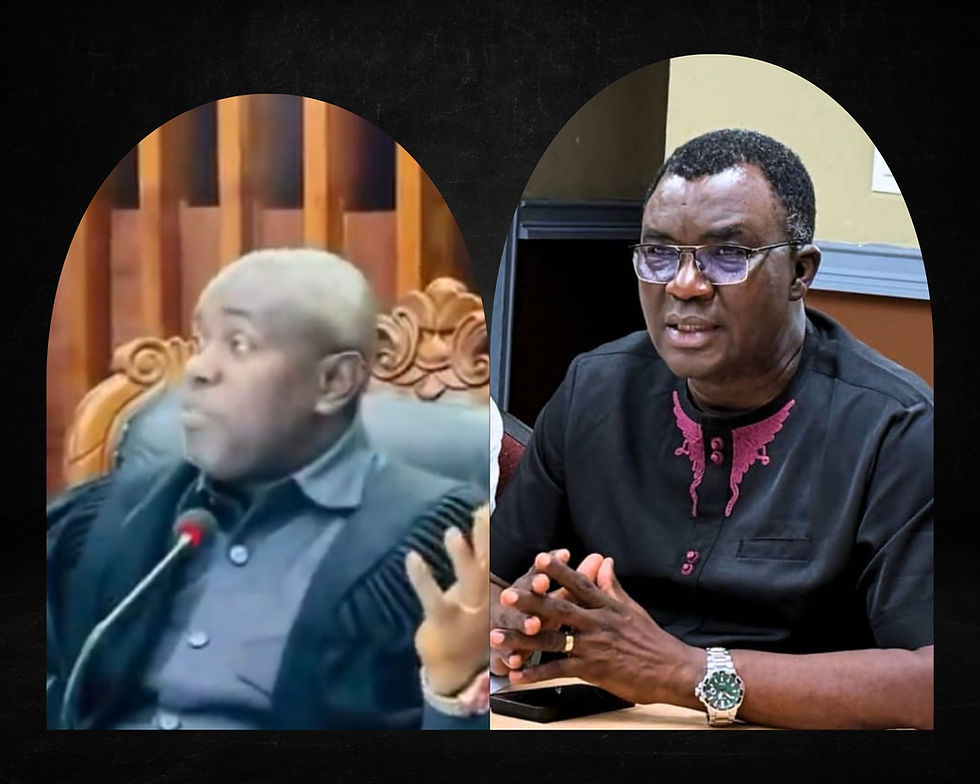Sufferation: Sierra Leone’s State of the Economy
- The Unifier Magazine

- Dec 3, 2024
- 4 min read

In a bustling market in Freetown, Mariatu Kamara adjusts her stall as the morning sun rises over Sierra Leone’s capital. Her small table, laden with fresh vegetables and a few packets of imported rice, tells a story that resonates with millions across the country—a story of survival in an economy struggling to find its footing.
Every day, Mariatu grapples with rising prices. The cost of a bag of rice, a staple for Sierra Leonean families, has nearly doubled in the past year. The little money she makes from her sales barely covers her family’s needs. “Everything is expensive,” she says, shaking her head. “It’s like the prices rise every day, but my income stays the same.”
Mariatu’s struggles are not unique. They reflect the broader challenges Sierra Leone’s economy faces—rising inflation, a depreciating currency, and deep structural issues that weigh heavily on the nation’s ability to recover and grow.
The Struggles of the Everyday Citizen
Down the road from Mariatu’s market, Ibrahim Sesay, a recent university graduate, sits in his modest room scrolling through job postings on his phone. Like many of Sierra Leone’s youth, Ibrahim is highly educated but unemployed. “I’ve sent out over 50 applications this year,” he says. “No one is hiring. I don’t know how I’ll ever start my life.”
Ibrahim’s frustration is mirrored by countless young people across Sierra Leone. The country’s unemployment rate, especially among youth, is alarmingly high. Despite their potential, many young Sierra Leoneans face a future of uncertainty, with limited opportunities to contribute to the economy or build meaningful lives.
In rural areas, farmers like Alhaji Koroma contend with a different but equally harsh reality. Alhaji wakes up before dawn to tend to his small plot of land, where he grows cassava, rice and bananas. The rains, once predictable, have become erratic due to climate change, threatening his harvest. Without access to modern tools or affordable loans, Alhaji’s farm yields just enough to feed his family, with little left to sell. “Farming used to be a way to survive,” he says. “Now it feels like a gamble.”
And then there’s Agnes. A government employee in Freetown, Agnes earns a monthly salary of just 7,000 NLE—a sum that vanishes almost as quickly as it arrives. Every month, she is forced to choose between paying for her daily commute to work, buying a bag of rice to feed her family, or covering her daughter’s school expenses. “I work hard every day, but it feels like I’m running in circles,” Agnes laments. “How can I send my daughter to school if I can’t even afford the basics?”
Agnes’s plight highlights the struggles of many civil servants in Sierra Leone, whose salaries have not kept pace with the rising cost of living. Despite working for the government, she finds herself sinking further into debt, borrowing from friends and family just to make ends meet.
The Weight of Economic Challenges
The challenges faced by Mariatu, Ibrahim, Alhaji, and Agnes stem from larger issues that have plagued Sierra Leone’s economy for years. The country’s reliance on mining exports, such as diamonds and bauxite, makes it vulnerable to global price fluctuations. Meanwhile, inflation continues to erode the purchasing power of everyday citizens, and the national currency, the Leone, struggles to hold its value.
The government’s rising debt burden complicates matters further. With much of the country’s revenue going toward debt servicing, there’s little left to invest in critical areas like healthcare, education, and infrastructure. This reality is felt acutely in communities where roads are crumbling, schools lack basic supplies, and hospitals are understaffed and under-equipped.
Corruption and weak governance exacerbate these issues. Funds meant for public services often disappear, leaving citizens to bear the brunt of inefficiency and neglect. For people like Mariatu, Ibrahim, Alhaji, and Agnes, this lack of accountability deepens their sense of frustration and disillusionment.
What is the Path Forward?
Sierra Leone’s economy, like its people, is marked by resilience and potential. To unlock this potential, bold steps must be taken:
Diversify the Economy: By investing in sectors like agriculture, manufacturing, and technology, the country can reduce its reliance on volatile mining exports and create more stable sources of income.
Support Small Businesses: Programs that provide affordable credit and training can help entrepreneurs like Mariatu expand their businesses and contribute to the local economy.
Empower the Youth: Vocational training programs and job creation initiatives are critical to ensuring young people like Ibrahim can build meaningful futures.
Invest in Infrastructure: Reliable roads, electricity, and clean water are essential for both urban markets and rural farmers to thrive.
Combat Corruption: Strengthening institutions and enforcing transparency will ensure that public resources are used effectively to benefit all citizens.
Build Climate Resilience: Supporting farmers with tools, education, and infrastructure will help mitigate the effects of climate change on agriculture.
We Have a Shared Responsibility
As Sierra Leone navigates its economic challenges, the burden cannot rest on the government alone. Civil society, private sector actors, and international partners must come together to create a sustainable path forward. Most importantly, the voices of ordinary citizens like Mariatu, Ibrahim, Alhaji, and Agnes must be heard and included in the country’s development agenda.
Sierra Leone’s story is one of struggle, but it is also one of hope. With collective effort and determination, the nation can transform its economic reality, ensuring that the next chapter is one of growth, opportunity, and shared prosperity.











Comments